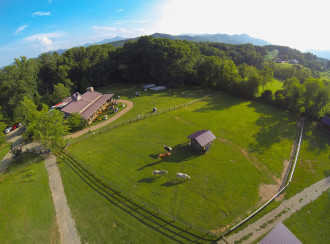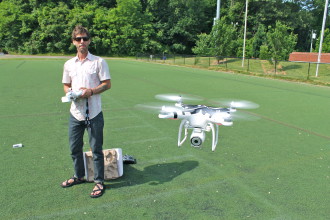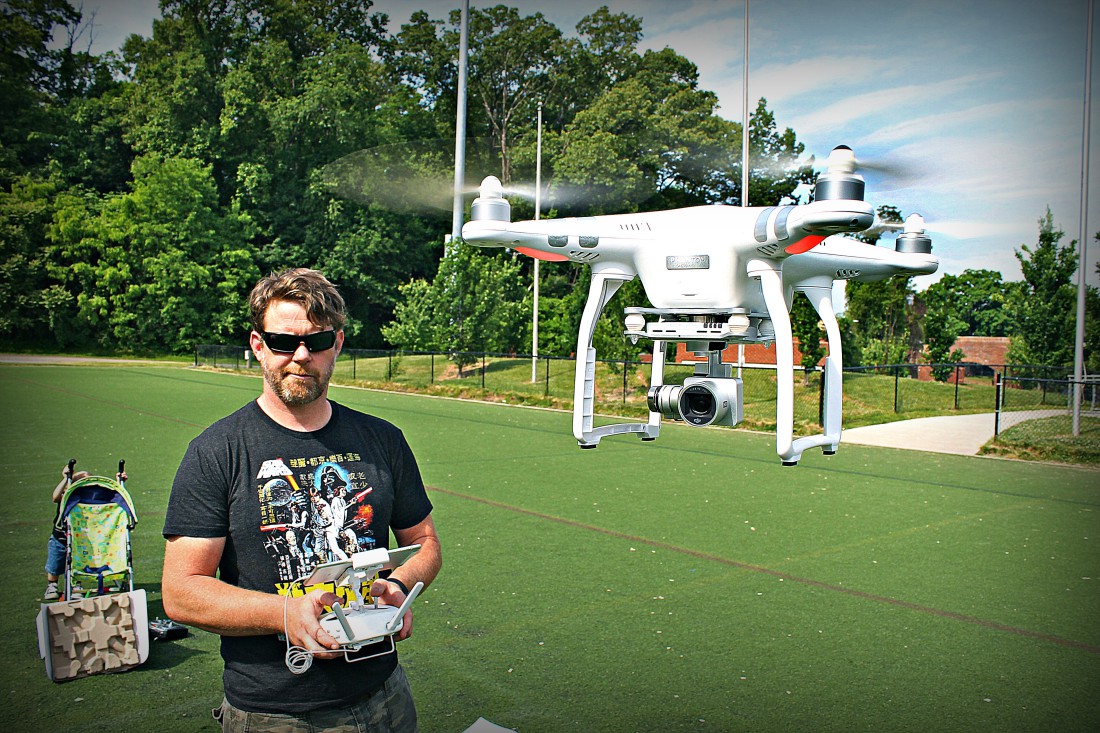With the Federal Aviation Administration still many months away from issuing rules on the commercial use of drones, Western North Carolina entrepreneurs are eager to offer customers a bird’s eye view. Thanks to high-resolution cameras and relatively modest cost, drones (aka unmanned aircraft systems) are considered a game changer for things like airborne surveillance and photography.
Those commercial applications are in limbo till the rules are finalized. Despite the FAA ban, however, some local businesses are already using drones.
“Aerial photography is now spectacular AND affordable,” proclaims dragonflylive.com, the website for Nathan Silsbee’s Asheville-based company. Silsbee says he’s shooting weddings, real estate, adventure sports such as skiing and other commercial applications.
“Traditional photography and videography are very much used in the media today,” he explains. “Those types of angles are becoming a little bit boring. When you see something from the air, it’s really unique. We’re excited to offer that commercially; the possibilities are endless.”
Aiming to prevent aviation disasters, the FAA issued draft rules in February governing who can fly drones and under what conditions. Commercial operators would have to pass a written test, register the drone and pay about $200 in fees. Businesses could fly only during daylight hours, and the devices would have to stay in sight of the operator or other observer charged with monitoring the drone. They could fly no more than 100 mph and would have to stay below an altitude of 500 feet to avoid collisions with other aircraft.
But a public comment period on the proposed rules is expected to last at least until early in 2017, and in the meantime, it’s illegal to charge money for flying drones. Once the regulations are finalized, the agency anticipates that more than 7,000 operators will obtain drone permits within three years.
“I think it’s important that it’s regulated and that people have qualifications to fly them commercially, because they can be dangerous,” notes Silsbee. “Whether the FAA gets their ducks in a row or not, people are going to be flying them. It’s very important that they finalize those regulations, so people like us can promote our services on a large scale.”
Meanwhile, the rapidly evolving technology has privacy advocates worried about overzealous governments spying on citizens.
Privacy concerns
Last August, the N.C. General Assembly passed legislation setting guidelines for the use of drones by police and other public agencies. The American Civil Liberties Union of North Carolina opposed the measure, which was tucked into a budget bill approved in the session’s waning hours.
Sarah Preston, the organization’s acting executive director, says she worries about ever-present “eyes in the sky.” No law enforcement agency in the state is using drones yet, says Preston, but it’s inevitable that some will.
“Our concern is that law enforcement is going to start using drones to surveil people while they’re on their own private property and while they’re at First Amendment-type activities like rallies or protests,” she explains. “Essentially, what we would like is for the use of these drones to be subject to the same restrictions as any other type of surveillance — that law enforcement needs to get a warrant to surveil or track an individual or to basically keep an eye on somebody’s private property.”
But the state legislation, she points out, allows drone surveillance of public gatherings on private property. “So if I invited a large group of people over to my house for a barbecue, let’s say, law enforcement could then use a drone to surveil my property without the property owner’s permission and without a warrant.”
Police, notes Preston, could also use drones to monitor public rallies or protests, employing biometrics or facial recognition technology to track who’s attending such events and what sort of political affiliations they have.
And unlike other kinds of aircraft, she explains, drones “can be incredibly small and very quiet, so it’s unlike a helicopter, which is going to be some distance from your property just by the nature of how it’s flown. Drones can get very, very close to your property — it can get close-ups of your property, of you on your property — and for that reason it poses a special privacy risk.”
Asheville activist Barry Summers calls the state’s law enforcement provisions “a step toward eroding a free society. Anyone you meet, any rally you go to, there could be a drone overhead collecting video and audio on anyone who’s there.” Any time someone is on public property, “They can follow you with a drone without a warrant.”
But Summers’ concerns don’t end there. “The real creepy one,” he continues, “is that anything a law enforcement officer can see within his field of vision, they can put a drone there without a warrant. So if he’s standing on the sidewalk and can see your backyard, they can fly a drone over your backyard. Imagine if an aggressive law enforcement agency decides to push the envelope on that.”
Potential applications

An FAA waiver allows the NextGen Air Transportation Center, based at N.C. State University, to test-fly drones at sites in Butner, Moyock and Hyde County, N.C. The testing includes photographing farmland as a potential way to assess crop damage.
Kyle Snyder, the center’s director, estimates that the drone industry could create more than 1,100 jobs by 2025. He told a legislative panel last year that state law enforcement agencies, the Department of Transportation and the Department of Environment and Natural Resources are all interested in using drones.
In 2013, the General Assembly imposed a moratorium on governmental use of drones and established a study commission after the city of Monroe announced plans to buy a drone for its Police Department. The state’s chief information officer, however, can issue waivers.
Under the 2014 state law, drone operators would have to be at least 18 years old, have a valid driver’s license and pass a skills test. But those requirements won’t take effect until the FAA finalizes its own rules.
Meanwhile, Asheville resident Ty Hallock says he’s working to help organize a local drone flash mob. The idea would be to fly about 40 drones equipped with LED lights at night, creating a showy visual display that would underscore the need to deal with the drone issue. “There’s not really legislation in place to allow us to move forward with these entrepreneurial ideas,” he says.
Hallock foresees using drones for things like checking water quality in streams and rivers or delivering vaccines to remote areas. But first, the rules of the game need to be in place.
“The opportunities for the entrepreneurial community in places like Asheville and Silicon Valley can do a lot better if we have proper mechanisms,” he maintains.
A popular hobby
The FAA already has basic rules for hobbyists in place. Those drones must be kept below 400 feet in altitude, within sight of the operator and away from airports.
About a year and a half ago, Clark Cross bought a small drone at an Asheville hobby shop for $99. He took it home, flew it for about a week and was hooked. Soon, he had to have a bigger one.
“The appeal is definitely getting a bird’s eye view of stuff,” he reports. “It’s getting video and photos that until now you would not be able to get without a helicopter. You can fly over animals without spooking them.
“I went to Devil’s Courthouse, up off the Parkway, and I was able to sit in my jeep in the parking lot and fly all the way to the base of the mountain and then pan all the way up to the observation deck. It’s just beautiful.”
Cross, who owns a garage door company, says he’d like to get into the drone photography business. He’s got friends in real estate and contracting who could use such services.
“A lot of them want me to get some aerial footage of their listings or their finished houses,” he reveals. “I haven’t charged for anything like that yet. I think it would be a pretty easy source of income, especially given how much easier they are to fly now.”
Commercial appeal

Low overhead and relatively inexpensive equipment are part of drone photography’s appeal for budding entrepreneurs.
“It’s kind of crazy,” says Cross. “For $1,000 you’re getting an HD camcorder that shoots 1080p video, 13 megapixels, that you can send 1,500 feet into the air. I learned pretty quickly how to repair them, because if you fly them you’re going to crash them.”
Local drone enthusiast Dan Caylor spent about $1,200 for a DJI Phantom, plus another $100 for an extra battery. The popular model is the same one a man crashed near the White House recently. Thanks to advances in GPS technology, notes Caylor, operating these devices is “super easy. If you take your hands off the controller, it will just sit there and hover. It’s so easy just to take it out of the box and get it up flying.”
Caylor says he’s used his drone at weddings, but he mostly considers flying it and shooting video from up high as just a fun hobby. “To me, it’s just being able to get up there and get a different perspective on the world, a bird’s eye view. It’s just really cool.”
Asheville Multimedia owner Bob Peck says he’s been using a drone to get what he calls an “establishing shot” for his wedding videos. But he’s careful not to violate the FAA ban.
“It’s one of those fine lines you have to walk,” he explains. “I tell people that a drone shot is just a part of what you’re getting; it’s not what you’re paying for. It’s just like one shot in the video. The FAA will actually fine people, but there are so many people out there flying those, it’s kind of hard for them to police everyone and shut everyone down.”
Peck concedes that there are dangers associated with flying drones, adding that he tries hard to avoid them.
“I’m always super cautious about not flying over people or buildings or property,” he reveals. “I don’t want to damage anything or hurt anybody. I’ve flown a drone where the battery just quit and it just shut down. It’s kind of scary to think that it could fall on somebody, especially from a high elevation.”
Potential pitfalls
A YouTube video depicting a mishap at a wedding went viral last year.
“The couple was, like, kissing and posing,” says Peck. “The drone was sweeping toward them, and it totally ran into the bride and kind of knocked her over. That’s totally not cool.”
Peck says he recently shot an event at The Omni Grove Park Inn and began using a drone to get an exterior shot of the hotel when he was stopped by a security guard who cited privacy concerns. “I respected that and brought it down immediately,” he notes, adding, “I’m not using it for any nefarious purposes.”
But there’s no doubt that drones offer a photographic perspective that can’t be had otherwise, Peck maintains.
“I think it’s a great opportunity for people like me and other people out there who use it for other reasons. There are just marvelous shots you can’t get any other way. It’s opening up all kinds of creative outlets.”
To learn more about drone use, visit knowbeforeyoufly.org.




And for the third year in a row, language affecting the government use of drones in NC has been pulled from the normal legislative track, and quietly inserted into the budget, where it will go unnoticed, undebated, and unreported. That’s exactly how a government surveillance capability should happen in a free society, right?
http://ncleg.net/Sessions/2015/Bills/House/PDF/H97v5.pdf page 269
The State’s drone testing program is about far more than agriculture, aerial photography, etc. To find out what’s really driving this issue, read:
When The Reapers Come Home: a look at the plan to open US domestic airspace to military drones.
http://reaperscomehome.blogspot.com/
These are very handy items, but our insurance carrier literally gasped when he learned we were buying them. After wrangling with the FAA FSDO in Los Angeles, our lawyer and insurance agent, our company now mandates no flights over people, no flights in controlled airspace, changing our Location Releases to include the use of these devices, and only licensed pilots can operate the devices. A hassle? Yes. Worth it? Absolutely.
Wow very nice photography. Photography and videography always have a unique role in any occasion. Aerial photography’s application is not limited to just environmental studies or artistic movie shots featuring a glorious golden or glowing night skyline but also to commercial fields like real estate, survey sites or even personal interests like low altitude wedding or other parties and celebrations aerial shots, etc. Get Aerial photography services by singaporeaerialphotography.com